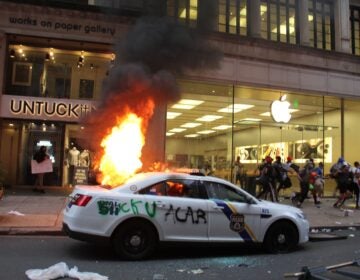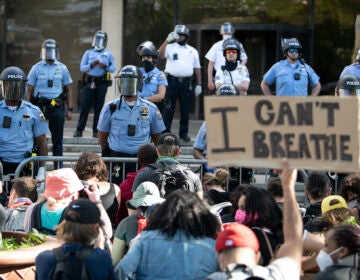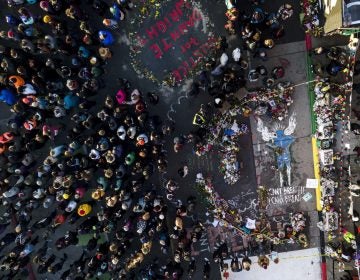For Black Philadelphians, centuries of injustices come to a head in George Floyd protests
More than 500 people gathered at Philly City Hall for a peace rally Sunday, where the death of George Floyd wasn’t the only injustice on their minds.
Listen 0:56-

Organizer Melissa Robbins remembers Octavius Catto, a Black educator, who was killed in 1871. (Kimberly Paynter/WHYY)
-
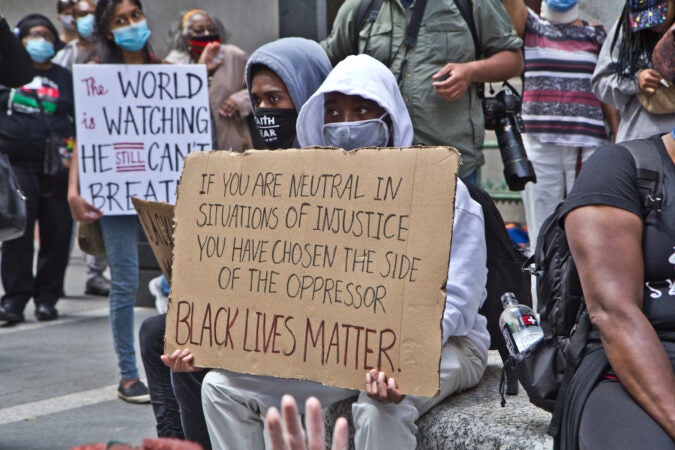
Protesters peacefully called for systemic change in the U.S. after a night of riots throughout the country. (Kimberly Paynter/WHYY)
-
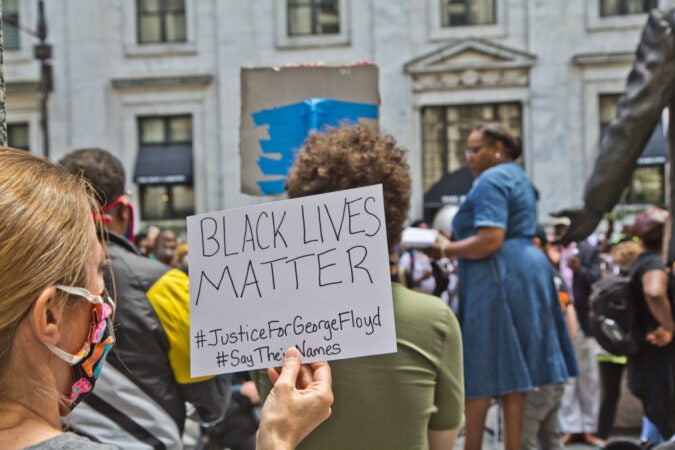
Philadelphians peacefully protested the deaths of Black people in the U.S. at the hands of police at City Hall Sunday. (Kimberly Paynter/WHYY)
-
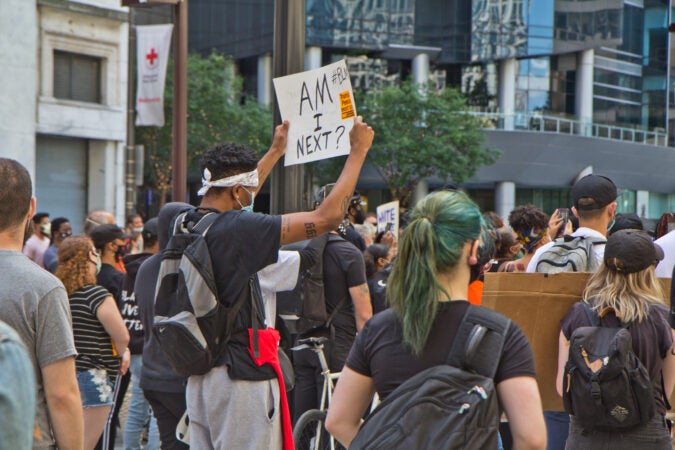
Protestors gathered peacefully at City Hall’s Octavius Catto statue after a night of unrest in Philadelphia. (Kimberly Paynter/WHYY)
-

Philadelphians peacefully protested the deaths of Black people in the U.S. at the hands of police at City Hall Sunday. (Kimberly Paynter/WHYY)
-
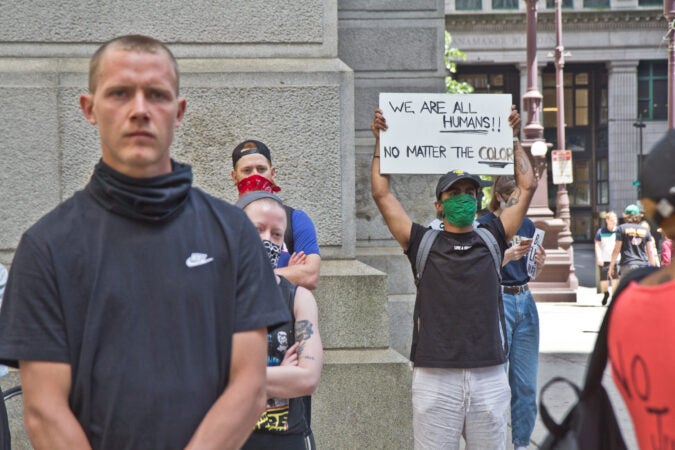
Protesters peacefully called for systemic change in the U.S. after a night of riots throughout the country. (Kimberly Paynter/WHYY)
-

Philadelphians peacefully protested the deaths of Black people in the U.S. at the hands of police at City Hall Sunday. (Kimberly Paynter/WHYY)
More than 500 people gathered Sunday in front of Philadelphia City Hall for a peace rally, demanding that Minnesota Police Officer Derek Chauvin’s third-degree murder charge be upgraded to murder in the first degree for the death of George Floyd.
“The officer that’s arrested is not enough,” said Philadelphia NAACP Chapter President Rodney Muhammad. “[The other officers] need to be charged and they need to be convicted, and they all need to be sentenced.”
Standing near the statue of civil rights activist Octavius Catto — Philadelphia’s first public monument to an African American erected in 2017 — protestors cheered at calls for Chauvin’s three colleagues to be charged with third-degree murder for standing by while Chauvin, who is white, pressed his knee into Floyd’s neck for nine minutes.
Still, Floyd’s death was just the tip of the iceberg.
There was anger aimed at major news outlets, which continued to air the graphic video of Floyd’s final moments, retraumatizing Black people forced to watch it.
“We’re tired of seeing brother George Floyd take his last breath,” explained National Action Network PA Chair Paula Peebles. “We’re tired of hearing him call out for his mother and two daughters.”
They also expressed anger over how Louisville police shot and killed Breonna Taylor in her own home in March, said Melissa Robbins, the Philly activist who helped organize Sunday’s event at City Hall.
Also fresh on people’s minds, said Robbins, was how Ahmaud Arbery couldn’t go for a jog in his own Georgia neighborhood without being followed and fatally shot by two white men.
Demonstrators decried a white woman in Central Park who called the police on a Black bird-watcher and asked local law enforcement to rescue her from an “African American man threatening” her life.
Janes United Methodist Church Pastor Gregory Holston said the way Amy Cooper used “her language and her tone to be able to exploit her white privilege to be able to persecute somebody Black” was learned behavior.
“You gotta stop that,” Holston told white people in the crowd. “I can’t stop that. I’m not at that table. You’re at that table! You’ve got to stop it.”
And yes, said Peebles, Black Philadelphians are also angry about the fact the late Philadelphia Mayor and Police Commissioner Frank Rizzo still has a statue in Philadelphia, despite his record of brutality against communities of color in the city.
“[Mayor Jim Kenney] refused to take down that racist fascist, regardless of what he did to the Black community in Philadelphia,” Peebles said. An hour earlier, Kenney had announced plans to move the statue, “hopefully” within a month.
Other speakers said the protests were about calling attention to how segregated Philadelphia remains and how gentrification is changing the face of the city.
“Stop hurting us, stop denying us jobs … Stop denying us an adequate education,” Robbins said, speaking directly to white demonstrators in the audience.
Speakers placed much of the burden to change implicit and explicit racism — a result of slavery and Jim Crow, they said — on their white counterparts.
Still, Robbins said the goal of Sunday’s peace rally was not to make white people feel guilty, but rather to give Philly residents marching orders for how to create lasting change, the first of which was to vote in Tuesday’s primary.
“The power is in your vote,” Robbins said. “If you do not exercise your power, you are part of the problem.”
Harnessing the collective grief and anger being felt by the Black community, was chief among the recurring themes of the more than two-hour rally.
Fresh in the minds of organizers were the images of the looting and vandalism that had taken place Saturday night, and continued on Sunday, spreading to other neighborhoods in the city.
WURD host and WHYY columnist Solomon Jones said residents were right to be angry because Philly, like Minneapolis, has a police force that has long faced accusations of racism.
Residents need look no further than a series of misogynistic and racist Facebook posts made by more than 300 city police officers, which were made public by the Plainview Project. Following that revelation last year, Philly residents laid out their demands to the city, and more than a dozen officers were fired or chose to leave the force.
Jones urged protestors to make their demands clear once again.
“I understand people being angry and burning stuff down. I understand people being angry and looting. I understand people being angry and destroying stuff — but what is your agenda?” Jones asked the crowd. “Because if you don’t have any demands, guess what, power concedes nothing without a demand.”
Attendees like Taija-Dawn Coleman denounced the looting, but she said she understands why it’s happening.
“We’re tired of being killed, we are tired of being treated unjustly, we’re tired of literally fighting for human rights,” she said. “And the only way that it seems white people understand us is if they feel physically or financially unsafe.”

Get daily updates from WHYY News!
WHYY is your source for fact-based, in-depth journalism and information. As a nonprofit organization, we rely on financial support from readers like you. Please give today.


